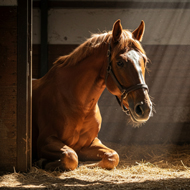Horse miscarriage study identifies chromosomal errors
The researchers studied 256 cases of pregnancy loss.
Scientists have identified chromosomal errors that are a common cause of pregnancy loss in horses.
The findings mean that it is now possible to account for potential causes in around 60-70 per cent of early pregnancy loss cases. The previous figure was around 20-30 per cent.
This new information could help veterinary surgeons managing equine pregnancies, allowing pregnancy losses to be screened so that a diagnosis for the loss can be made retrospectively. It could also help researchers to target the mechanisms that lead to the chromosomal errors.
The research team, which was led by Cornell University and involved researchers from the Royal Veterinary College (RVC), looked into chromosome aberrations in 256 cases of pregnancy loss involving 244 mares.
They found that chromosomal errors occurred in 57.9 per cent of pregnancy losses in the first 55 days of gestation, in 57.2 per cent of losses between days 56 and 110, and in 1.4 per cent of losses after day 111.
The findings showed that triploidy (three haploid sets of chromosomes) was the most common chromosomal error, occurring in 42 per cent of losses during early pregnancy.
Mandi de Mestre, a professor at Cornell University and corresponding author of the study, said: “Over that embryonic period, triploidy had rarely been reported in mammals outside of women.
“The study tells us that over the first six weeks of gestation, this will likely be the primary cause of pregnancy loss following natural conception.”
The team also found trisomy (the addition of one whole chromosome) and monosomy (the loss of one whole chromosome) in nearly 12 per cent of pregnancies.
The link between chromosomal errors and pregnancy loss in humans is widely acknowledged, but until now there has been a limited number of reports in other species. Both human and horse chromosome structures share similarities, meaning that horses could be used as a model for studying human miscarriage.
Jessica Lawson, research fellow at the RVC, added: “In addition to the significant findings in the early stages of the equine pregnancy we, for the first time, have identified sub-chromosomal aberrations in an aborted foetus and a stillborn foal.
“These aberrations likely constitute a rare but important cause of later term pregnancy loss, and we look forward to continuing to investigate the clinical significance of these genomic changes.”
The study has been published in the Proceedings of the National Academy of Sciences.
Image © Shutterstock



 Zoetis UK has called on horse owners to complete a short online survey about their horse's behaviours.
Zoetis UK has called on horse owners to complete a short online survey about their horse's behaviours.